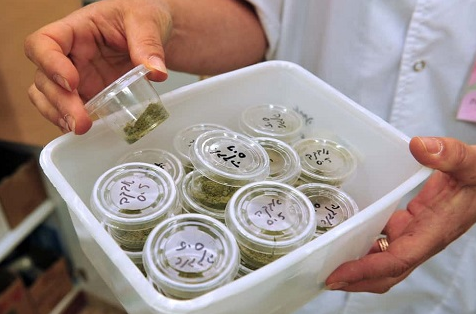Doctor Suggests Medical Marijuana to Lower Mortality Among UK Prisoners
British prisons are currently facing a surge in heroin addiction, which has led to a noticeable increase in inmate deaths due to drug overdoses. Last week, Dr. Stephanie Sharp from Scotland proposed that authorities legalize the use of therapeutic marijuana among prisoners to help reduce the fatality rate of this ongoing epidemic.
It’s important to note that heroin addiction has long been a problem outside of Scottish prisons as well. The illegal opiate market thrives on the streets of major cities, and police efforts to combat it have focused mainly on mass arrests, which only worsen the situation.
Criminalization Leading to Deaths
UK laws strictly prohibit the production, possession, and use of marijuana, including for therapeutic purposes. As a result, many chronically ill British citizens have had to seek legal access to marijuana-based medicines abroad. Despite the tough stance against both dealers and users, criminalization has only exacerbated the problems of the black market and drug addiction.
Dr. Sharp believes that authorities should fully legalize marijuana, including granting access to prisoners, as a way to address the country’s opioid crisis. She also argues that legalization could significantly reduce deaths related to the use of so-called “synthetic cannabinoids,” commonly known as spice.
At the end of 2016, Scotland reported grim statistics confirming over a thousand fatal overdoses due to opiates and spice. Many activists supporting reform of marijuana and other mild psychoactive substances saw these numbers as clear evidence of the failure of strict prohibitionist policies that have been in place for 50 years. Experts from the National Agency for Drug Addiction Therapy share a similar view, noting in their annual report that at least 380,000 people in Scotland suffer from severe physiological and psychological drug dependence.
Most people imprisoned in Scotland for drug-related offenses are simply marijuana users arrested for possession. The same situation is seen in other parts of the United Kingdom. Police statistics confirm that most people arrested for drug crimes are users, not dealers or manufacturers. For example, British police data from 2014 shows that about 67% of those convicted of drug offenses were found guilty of possessing small amounts of banned substances, particularly marijuana.
Imprisoning ordinary users for long periods has a negative impact on their health and quality of life, as shown by the rising death rate among inmates due to the use of synthetic drugs smuggled into prisons. Alarmingly, the opioid epidemic has also begun to affect prison staff, with recent reports of fatal overdoses among guards.
Given these factors, Dr. Sharp proposes legalizing marijuana use among prisoners to stop the rising death toll.
Expert Opinion
As a pharmacologist and founder of the Expert Witness Service, which analyzes street drugs for potential toxicity, Dr. Sharp believes that the wave of drug addiction can be overcome by providing people with safe alternatives to opiates and spice.
Unlike marijuana, which is strictly banned, smoking blends containing “synthetic cannabinoids” (known as spice or K2) are legally sold in the UK and many other countries, including the US, thanks to constant chemical modifications by underground chemists. Authorities simply can’t keep up with adding these synthetic poisons to the list of banned substances, as criminals continually release new versions.
Dr. Sharp points out that the main danger of these “marijuana substitutes” lies in their active ingredients, which are much stronger stimulators of the body’s endocannabinoid receptors than natural compounds like THC or CBD. Because of this, these substances can cause serious health complications not seen with marijuana use. Synthetic cannabinoids can overstimulate the body even in small doses, potentially leading to cardiac arrest if overused.
In contrast, marijuana containing natural cannabinoids cannot physiologically cause such complications, let alone fatal overdoses. Therefore, allowing its use in prisons could help authorities combat the underground market and prevent rising deaths among inmates and staff.
There have been cases in which spice caused poisoning among people who were not even users, highlighting the high risk of these smoking blends. For example, three guards at a Scottish prison were seriously poisoned by residual fumes while investigating the death of an inmate who suffocated in his cell due to spice vapors.
“We must accept that many inmates are regular drug users. Instead of forcing them to resort to extreme measures like using spice or hard drugs, we should provide access to formal substitution therapy by replacing dangerous substances with marijuana,” says Dr. Sharp.



